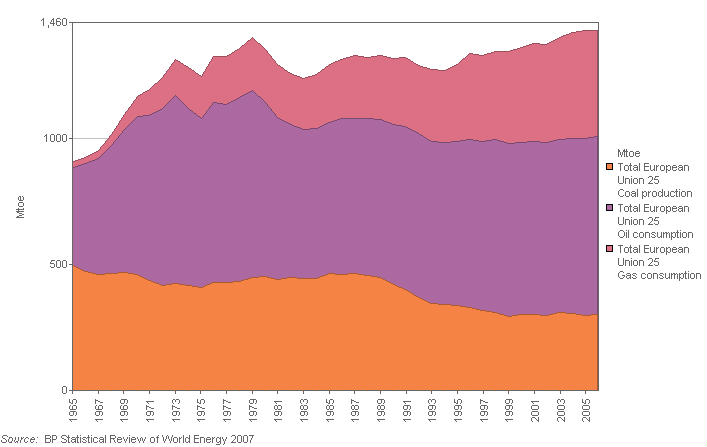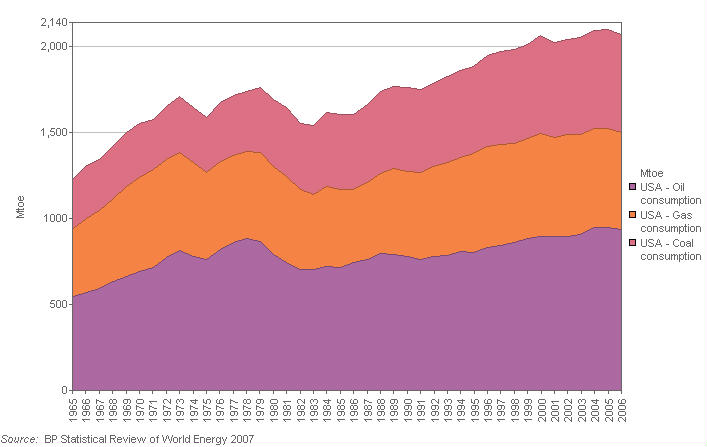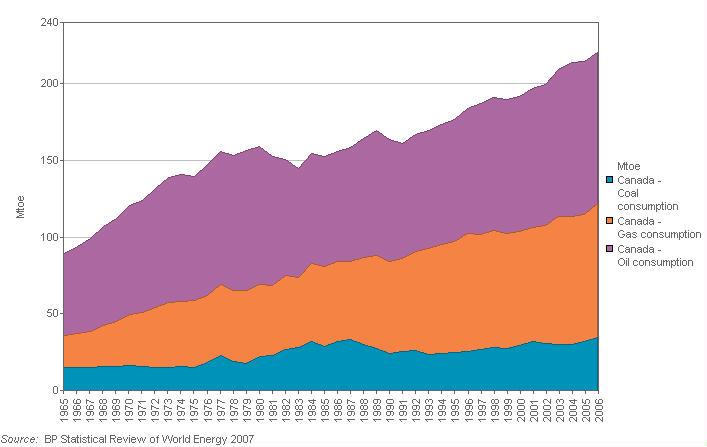|
MONDAY EDITION December 22nd, 2025 |
|
Home :: Archives :: Contact |
 |
Why are Canadians the World's Energy Pigs?Peter McKenzie-BrownEmail: pmbcomm@hotmail.com languageinstinct.blogspot.com December 8, 2007  Canada is rich, big and cold, and we share two borders with the United States. Those factors explain why we are the world’s energy pigs, but they do not justify it.
Canada is rich, big and cold, and we share two borders with the United States. Those factors explain why we are the world’s energy pigs, but they do not justify it.
Only the United States comes close to our per capita annual energy consumption - more than 8,300 kilograms of crude oil equivalent for every Canuck. Lots of American energy consumption comes from nuclear-fuelled electricity, while Canada’s nuclear industry is much smaller. That means we are relatively more dependent on non-renewable hydrocarbons than our neighbours to the south. So stand proud, Canada: The true north, strong and free, is number one in energy consumption and waste. Rich: Unless you are living in Caracas, where subsidized gasoline sells for three cents per litre, you have noticed that gasoline prices are skyrocketing. This concerns us all. Indeed, three quarters of Canadians worry that they will be personally affected by a gasoline shortage in the next five years, but their actions do not seem to match their anguish. Last year, for example, 43 per cent of Canadians reported increasing their consumption of gasoline during the previous three years, compared to 21 per cent who reported lowering it. Yet during that three-year period, prices nearly doubled. This partly reflects the economic good times of recent years. Many Canadians have seen their personal wealth (think house prices) grow greatly. For many, this has made gasoline price increases – a small part of most household budgets – seem less significant than they would in a recession, say. The relative insignificance of gas pricing today is one of the main reasons we are less likely to change our driving habits than we did during the last great run-up in gasoline prices, between 1975 and 1980. We have become addicted to gasoline, and that addiction is growing. The fact that we aren’t responsive to higher prices is contributing to the world's energy problems. Big and cold: Why do Canadians use a lot of energy? For one thing, we live in a large country with a cold climate. We need a lot of gas and heating oil for our homes, to power our economy and to drive long distances. Winter affects us in not-so-obvious ways. In the winter cold, the fuel efficiency of our vehicles drops. Also, of course, most of us would rather drive than stand at the bus stop in a blizzard, so we avoid the cold by getting in the car. Our driving habits and driving conditions are often fuel-inefficient. Many of us drive big vehicles, including SUVs and trucks, and we own more of them than in the past; the two-car family is the norm. Some of us drive at high speeds. Many of us carry extra weight (golf clubs and other sports gear, for example) in the trunk. And city roads are more likely to be gridlocked during rush hour. All of this wastes fuel. In addition, we have an increasing dependency on cars. Our vehicles are more fuel-efficient than in the past, but suburban development has created greater distances between home and the places where we work and play. Walking and cycling to work are less likely to be serious options for us than in the past, and suburbs often don’t have easy access to public transit. So we drive. Nation-wide, only about one adult Canadian in four walks, cycles or takes public transit to work or school. Sixty-one percent of us drive our cars every day. America’s neighbour: Most Canadians believe we do some things better than the Americans. In particular, we think we have created a more civil society. Illogically, from that starting point we seem to believe we also do better in the matter of energy consumption and management. As these graphs show clearly, it just ain’t so. Among the world’s developed economies, Canada remains the most wasteful consumer of hydrocarbon energy. In response to the energy crises of the 1970s, Western Europe kept its per capita consumption in check. (See small chart.) So did Japan and Korea, after they became fully developed economies. 
For their part, the North Americans were quite a different story. Like the Eveready bunny, their demands for ever more energy kept going and going and going.  In the United States, Americans showed a continuing aversion to high energy taxes. That isn't surprising: let’s not forget how much the American economy was fuelled by its vast energy wealth throughout the twentieth century. Whatever the reason, successive US governments refused to impose high taxes on fuel in the way most other OECD countries did.
In the United States, Americans showed a continuing aversion to high energy taxes. That isn't surprising: let’s not forget how much the American economy was fuelled by its vast energy wealth throughout the twentieth century. Whatever the reason, successive US governments refused to impose high taxes on fuel in the way most other OECD countries did.
Neither did Canada, arguing that increasing energy costs would put the country's industries (many of them energy-intensive, resource extraction businesses) at a disadvantage compared to those of its biggest trading partner and competitor. The result? The world’s energy pig got bigger and consumed, in relative terms, more and more non-renewable energy. And it did so as the world made striking advances in energy-efficient technologies, processes and procedures. Compare the rate of consumption growth in Canada (chart below) to that in America (above). Population growth in the two countries has been roughly the same. 
As the result of good luck, Canada has oilsands that will be supplying the world's energy markets a hundred years from now, and we have other world-class resources - natural resources, of course, but others that include our people and our social systems. As a society, we have done many things right. Our educational systems are rated among the best in the world. We have relatively little crime and a social safety net for the poor and dispossessed. We welcome refugees, and we take pride in our social diversity. We have universal health care and gun control. In some ways, perhaps, we have created a more caring society than our neighbours. Much of our energy consumption goes toward extracting minerals and manufacturing light oil from the oilsands and refined products for export to the States. Even so, the disproportionately increasing demand for energy in this country is nothing to be proud of. It is a national disgrace. Peter McKenzie-Brown Email: pmbcomm@gmail.com languageinstinct.blogspot.com December 8, 2007 |
| Home :: Archives :: Contact |
MONDAY EDITION December 22nd, 2025 © 2025 321energy.com |
|